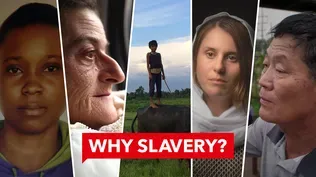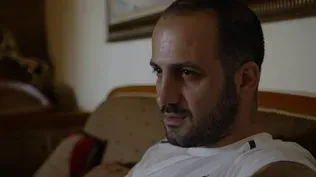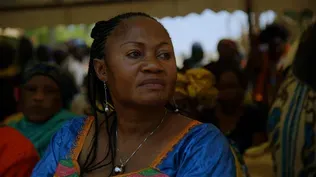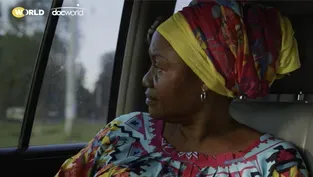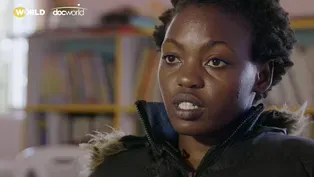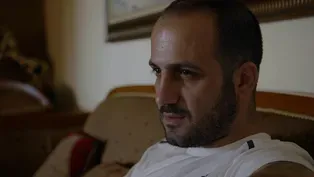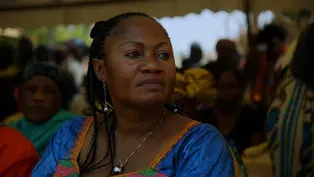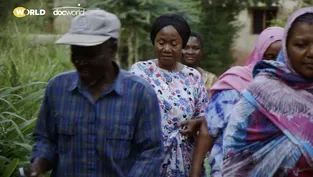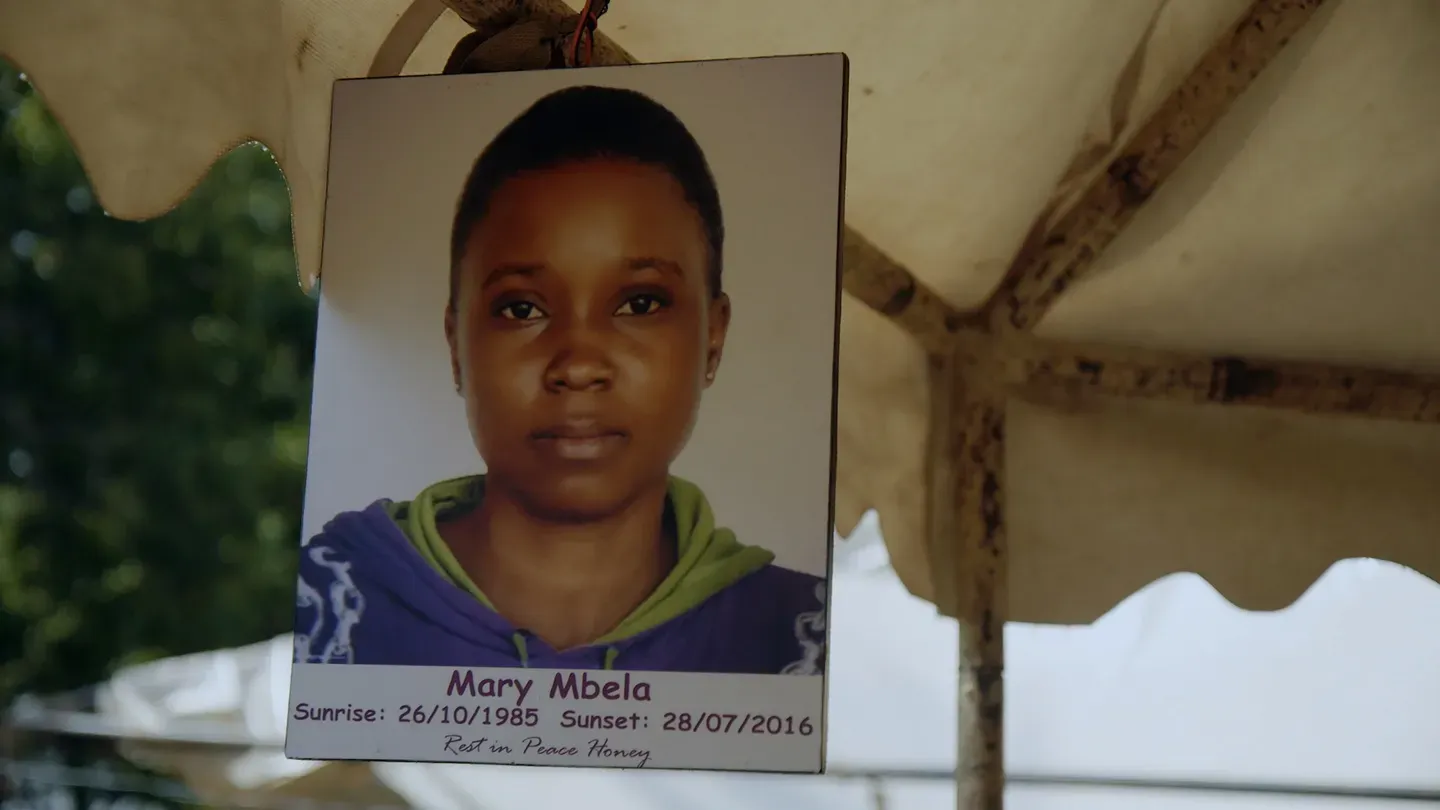

WHY SLAVERY? Maid in Hell
Season 4 Episode 13 | 58m 57sVideo has Closed Captions
Can an employment system hide a reality of torture and humiliation?
In 2016, Mary Kibwana, who worked as maid in Jordan, returned to Kenya with 70% of her body burned. Kibwana is one of many women in Africa and Asia trapped in the Middle East's Kafala System, a set of law governing migrant labor that binds them to their employers. The film gives unprecedented access to the inner workings the system, and the horrific reality faced by thousands of women each day.
Funding provided by the Corporation for Public Broadcasting. Additional funding provided by the John D. and Catherine T. MacArthur Foundation and the Wyncote Foundation.

WHY SLAVERY? Maid in Hell
Season 4 Episode 13 | 58m 57sVideo has Closed Captions
In 2016, Mary Kibwana, who worked as maid in Jordan, returned to Kenya with 70% of her body burned. Kibwana is one of many women in Africa and Asia trapped in the Middle East's Kafala System, a set of law governing migrant labor that binds them to their employers. The film gives unprecedented access to the inner workings the system, and the horrific reality faced by thousands of women each day.
How to Watch Doc World
Doc World is available to stream on pbs.org and the free PBS App, available on iPhone, Apple TV, Android TV, Android smartphones, Amazon Fire TV, Amazon Fire Tablet, Roku, Samsung Smart TV, and Vizio.
Providing Support for PBS.org
Learn Moreabout PBS online sponsorshipPRODUCER: How many hours did you work a day?
JESSICA MUSILI: Almost, uh, 18 hours.
ANNOUNCER: Across the Middle East, migrant women are employed as domestic workers.
The working conditions can be deadly.
RUCIANA MSHILLA (in non-English language): ANNOUNCER: Who is fighting for these women's rights and their humanity?
We are not animals!
There is no slave trade anymore!
ANNOUNCER: Maid in Hell on DocWorld.
♪ (phone dialing out) (dialing out continues) MAN (in non-English language, on phone): WOMAN (in non-English language): MAN: WOMAN: MAN: WOMAN: Mm.
WOMAN: MAN: ♪ ♪ WOMAN (on speaker): This is a special announcement.
For security reasons, please keep your luggage and all packages with you at all times until they are checked.
WOMAN: The sponsorship system known as Kafala has been described as modern day slavery.
WOMAN: It ties workers to their employers.
They can't change jobs or leave the country without their boss's permission.
MAN: The moment you land your passport is taken away.
You have no means of communicating.
This is a growing problem.
♪ (in non-English language, crying): (in non-English language, crying): (in non-English language, crying): REPORTER: More allegations of the torture of maids in Saudi Arabia have come to light.
REPORTER: Twenty-four nails hammered into her hands and forehead by her Saudi employers.
REPORTER: The Kenyan government has suspended export of domestic workers with immediate effect.
REPORTER: The Philippines, Nepal, and Ethiopia have banned their citizens from Lebanon, although many are so desperate, they find a way around the ban.
♪ (music playing) (singing along to music) MAHER (in English): I'm recruiting housekeepers to Lebanon, 12 years already.
It's in my blood.
(whistling along) (music continues playing, Maher humming along) HASNA (in non-English language): (cellphone chimes) HASNA: MAHER: HASNA: MAHER (in English): Saturday they should... depart from Manila at the nighttime.
They would have arrived today.
But they did not... they did not travel.
MAN: But do you know why they were stopped?
HASNA (in non-English language): MAHER (in English): Because they are traveling illegally.
HASNA (in English): It's illegal.
Illegal to travel, that's why.
HASNA: From 2006 until now.
MAHER: We are paying money for the immigration under the table.
They enter Lebanon legally, by visa, by everything.
It's legal in Lebanon.
But the traveling from Philippines, it's illegal.
♪ MAHER: (Marivik answers) Give me lighter.
(Maher clears throat) Marivik, she come to our house.
Sure, she's afraid.
We don't know her, and she don't know us.
After two or three months, she have the key of the home and she can do everything in the house, but the passport is with us.
Why?
You are traveling to work, you are traveling to earn money, you are traveling to say yes for your employers.
You will treat them in a human way, but there is a respect and there is red lines they cannot pass.
MAN: That's what the critics say is wrong with the system.
Can you follow that?
It's wrong with the system?
MAN: That's what the critics say.
I don't think there is human rights in this world.
No way.
Maybe in Europe, but not in the Middle East.
(clicks lighter) I will not stop this business because I'm helping myself and I'm helping the other people.
♪ (distant car honking) EMMA MBURA: It's not only Kenyan girls who go to the Middle East.
We have girls from Tanzania, Uganda, Philippines, we have girls from all over the world.
And they don't go there as refugees.
They go there to earn their living, to work.
♪ I went to work in the U.A.E.
as a nanny.
And I used to see how domestic workers were treated.
(conversation in non-English language) MBURA: They used to work for years without pay.
They were not allowed to go home.
They were beaten.
(man shouting in non-English language) They were sexually abused.
Some of them were raped.
(woman crying out) It was inhuman.
And the day I was sworn in as a senator, that is when the battle started.
(insects chirping) MBURA (in non-English language): WOMAN (in non-English language, on phone): WOMAN (in non-English language, on phone): (indistinct chatter) MBURA (in English): This is my firstborn, Diana.
My second-born, Ruth.
My third-born, Naomi.
And this is my fourth-born Edith.
I did not decide to go to the Middle East; I had no choice.
By that time, my husband had no job.
I had children to feed.
So that was the only option.
If you get a good family, you are lucky.
But I cannot advise anybody to work in the Middle East.
That is the last place Kenyan woman can decide to go.
REPORTER: A family here in Nairobi is mourning their kin who died in Jordan.
REPORTER: The body of another Kenyan was flown into the country from Saudi Arabia.
REPORTER: Beaten, tortured, others sexually assaulted-- a plea for help by a group of Kenyan women at a Saudi deportation center.
WOMAN (in non-English language): REPORTER: And it's not just Saudi Arabia.
It's the Gulf.
In most of these countries, if you're walking the streets without legal documentation, then you'll be arrested.
♪ (birds twittering) I was to come and work in a restaurant.
Only to my surprise that I came and got myself in the house.
They told me that, "You will be working eight hours per day, "five days in a week.
And every month, they will pay you $400."
They asked me for the passport.
Even I never saw it after.
First time I arrived I never saw it again.
MAN: How many hours did you work a day?
Almost, uh... 18 hours.
I woke up from 6:30 in the morning and I work until 11:00.
Nonstop.
So they did not pay me the first month, the second month.
Then in the third month, I asked them, "Why you don't try to pay me?"
MAN: Did she pay you the money?
No.
Nothing.
- No money?
- No money.
- No wages?
- No.
I called the agent.
I told him about the situation.
And he told me, "You came here to work, not to play."
I-I tried to explain to him, I... yes, I came to work, but the conditions, the... the life I'm going through is not a normal life.
(distant car honking) MAHER: There is many agencies in Lebanon not working in a legal way.
You are not dealing with cars, you are not dealing with an object.
You are dealing with a human.
(speaking non-English language) We as an agency, we should be in the middle to give advice to the employer and with the applicant.
HASNA (in non-English language): (greeting in non-English language) WOMAN: HASNA: HASNA: How old are you?
(speaking non-English language) LAM LAM: Twenty-two.
HASNA: Twenty-two.
(in non-English language): MAN: HASNA: MAN: HASNA: MAHER: MAN: HASNA: HASNA: MAHER: MAN: HASNA: ♪ MAHER: Here in Lebanon, you just work, you earn, and you spend.
(laughs, distant siren blaring) In this field, you cannot trust everyone.
Because there is no law, man.
No law.
Let's say Middle East governments, they don't respect the law.
And also everything in all the world is looking for money.
The poor, she need money.
And the agency, he need money.
I cannot get all the profit that I should get from Lebanon.
It's not enough for me.
I should work in the other... for the other countries.
(cellphone chimes) That's why I'm trying to make my business bigger than this.
And because I have the connections with agencies in the Africans countries, God give me a good work.
(seagulls cawing) MBURA: They're targeting the poor families, the illiterate girls.
When they are recruiting domestic workers, there is no requirement.
What they need is just a passport.
So this is the only job these girls can get.
(indistinct chatter) She left here when she was okay.
She went to Saudi for four years.
She was admitted in the hospital.
She was just dumped.
And when she reached here she could not speak.
To date she's not speaking.
They don't know what happened.
WOMAN (in non-English language): MBURA (in non-English language): Ah... why why why why why... MBURA: Wire?
Wire?
WAKIO: Uh-uh.
WAKIO: Uh-uh.
Why why why why why... WOMAN: (quietly sobbing) MBURA: The girls tell me, "If you cannot manage to create job opportunities, let us go to Saudi Arabia and die there."
I don't think Kenyan government done enough concerning this issue.
We must stop this.
As women from this country, we must stop this.
♪ REPORTER: The governments of Kenya and Saudi Arabia are working on a memorandum of understanding to ensure that Kenyan workers are well protected in Saudi Arabia.
REPORTER: Kenya and Saudi Arabia continue to enjoy longstanding warm and friendly relations.
The Royal Kingdom of Saudi Arabia has given more than billion U.S. dollars in the last four decades.
The two countries are working on a framework on labor relations, as the ambassador said, we'll be signing something soon.
But at least to correct the impression.
I've met many Kenyan workers, some from my own constituency, who have lived there many years and have been working and have been making money to their families.
♪ (sirens wailing in distance) MBURA: Right now we have our Kenyan girl who went to Jordan with serious burns.
I don't know what I'm going to see.
And I don't know why it happened.
MAN: Excuse me.
MBURA: They're with me.
MAN: You have to cooperate with people.
MBURA: Hm?
MAN: You're not supposed... You go through the appropriate people... MBURA: We just want to see the girl.
Only the girl.
(speaking non-English language): MBURA: 100?
RUCIANA MSHILLA: 100.
(speaking non-English language): MBURA: MBELA: MSHILLA: This is when they arrived at the airport.
All the way from Jordan to here seated in a wheelchair.
Now this is her.
♪ Now the world has come to know what is happening.
As a mother, as a leader, I will not stand, I will not sit and watch this kind of (bleep).
We are not animals!
There is no slave trade anymore!
(distant dog barking) (bird cawing, indistinct chatter) (children playing) (giggling) (playing continues) MBELA (in non-English language): (clicks teeth) ♪ (horns honking) (Maher speaking non-English language) (in non-English language): (laughs) SARA (in non-English language): MAHER: MAHER: SARA: MAHER: ♪ ♪ (din of a busy street, horns honking) MAHER: Hi, how are you?
Mr. Yousef is here, right?
YOUSEF AL-HABABIHA: Hello, how are you?
(Maher speaking non-English language) AL-HABABIHA: MAHER: AL-HABABIHA: MAHER: AL-HABABIHA: AL-HABABIHA: MAHER: MAHER: AL-HABABIHA: AL-HABABIHA: MAHER: AL-HABABIHA: MAHER: AL-HABABIHA: MAHER: AL-HABABIHA: MAHER: (both laughing) ♪ (in non-English language): ♪ Let's go.
ROSE: Just sit quietly, okay?
ROSE: Your name is?
RITA: Rita.
Hi, Rita, I'm Rose.
ROSE: And you?
PAULINA: Paulina ROSE: Paulina, I'm Rose.
You have mobile?
Okay, we are the one to keep first your mobile.
If your employer allow you to use it.
After your medical you have to come back here in the office.
And one-by-one the employer will come pick you up.
Okay?
So just relax.
WOMAN: Thank you.
ROSE: You're welcome.
And here you should know something.
The way that we talk, it's not that we are shouting.
You should not be afraid from anything.
We talk in a higher voice.
(laughing): Okay?
AL-HABABIHA: But for me, every month, we'll take your salary.
You like to hold, you have to hold it in the bank, otherwise you have to transfer it for your family.
Don't hold with the employer, please, okay?
I have two babies: one boy and one girl.
I have to build some nice house, give them better education.
That's the reason I just came here.
Don't send your money complete for your kids.
Okay, save some money for you.
You can buy land and you can build house, as you want, okay?
So don't be worried.
You are welcome here.
And you have... a good choice that you have Mr. Yousef.
He's one of the best agency in Jordan.
(Maher chuckles) RITA: Thank you, Dad.
I must call you Dad.
HABABIHA: Really?
Thank you.
(Maher speaking non-English language) (laughter) HABABIHA: I appreciate that.
Thank you very much.
And you too are so beautiful, really.
Thank you.
(laughs) HABABIHA: You're welcome.
♪ (din of busy street) REPORTER (in non-English language): (in non-English language): ♪ (speaking non-English language) MBURA (in non-English language): MBURA: WOMAN: MBURA: MBURA: MARY: MBURA: MARY: (voice breaking): MBURA: MARY: MBURA: The devil is a liar.
You are going to overcome this.
(in non-English language): (voice breaking): MSHILLA: (horn honks) (lighter clicks) MAN: Can you explain in detail what happened at the day of the accident?
(in non-English language): MAN: Did you notify the family in Kenya of what had happened?
(both speaking non-English language): ♪ (phone ringing) WOMAN (on phone): Hello?
Is this Peter?
MBELA (on phone): Yes, it is Peter.
I am calling from Jordan.
- Yes, thank you.
- Mary, she is in a good health, and tomorrow, after midnight, she will be in the airport.
I will send you the ticket for Mary.
- Do we need an ambulance tomorrow?
- Sorry?
- Do we need an ambulance?
Emergency car.
- No, you can take her without ambulance.
No problem.
- And how is she now?
- She is good.
She can talk, she can walk, she is good.
EZEKIEL MWASARU MSHILLA: She was hiding the truth.
She actually didn't want us to know how Mary had been burnt.
We thought that it was just, just some few burns.
We didn't know that it was serious.
Because she said, "Mary can walk, she can talk, inshallah."
WOMAN: So they were trying to get rid of Mary, and the only thing to do it was to tell lies.
(car horn honking) ROSE: Just leave your things here, because you will come back later.
And no one will touch your things, because I have cameras everywhere, okay?
Don't be worried.
MAHER: Yeah, let's go.
One, two, three, four... (laughs) Sometimes, the girl, she come over from her country, and she's pregnant, or if she's sick, this is a big problem.
You should travel her back.
We give them the medical tests in a private medical center.
And after this, if she is fine, they send my commission.
DOCTOR: We will start with tests for pregnancy, venereal, and hemoglobin.
And two tests for kidney, and two tests for liver functions.
ABENA: By the grace of God, I have been arrived very safely.
I don't know much about here... this my first time.
When you come, they will seize the phone.
So there is no need about for us to bring the phone.
MAN: But how are you going to keep in contact with your family?
- That is the main big problem that I have right now, because I don't know.
There is no problem, and... work is very important, so the reason why... (speaking non-English language) DOCTOR: Their tests are normal.
We have no problem with them.
These are good servants.
There is no problem with the tests.
(phone dialing out) (phone ringing) It's ringing.
ABENA: Thank you.
(phone ringing) WOMAN (on phone): Paulina?
- (laughing): Yes.
(speaking non-English language): (phone call ends) Thank you.
MAHER: These people, they are cleaning our dirty things.
They should not be ashamed.
They should be happy.
Whatever is the work, you should be proud of it.
But me, step by step, I am bigger and bigger.
I am dealing with five agencies in Jordan.
They have trust with me.
(both speaking non-English language): ALKASASBAH: Now...
These are our applicants.
Five of them, they arrived yesterday in the night.
And then we have our friend, she wants to change employer, right?
- Yeah.
- Okay, you want to ask the new arrivals any questions, please?
MAN: What do you know about what you are going to do here?
Because I have a mom there in... in Philippines, and then she is... MAHER: That is not his question.
Do you know what you will do?
WOMAN: I work here in Jordan.
MAHER: What, you work engineering, doctor, housemaid?
No, housemaid.
No, no, no, housemaid.
ALKASASBAH: Yes, domestic helper, you know your job.
- Yes, yes, domestic helper.
- That is his question.
You, what is your problem?
I am not... told by my employer to make two pieces of medicine given to her mum.
That's only the mistake I have.
ALKASASBAH: You give extra medicine for her mum?
- Yeah.
We will find her another employer, and she will start a new contract.
What's your name, please?
- Diana.
- Diana.
Diana, what's your problem?
(speaking non-English language) ALKASASBAH: She have attacked from djinni.
That's, that's what she say.
Some djinni attacked her, and she started dancing.
She can't control her body.
I don't believe in ghost, but in the end, the important part for me is her safety.
Why you are dancing in the video?
(speaking non-English language): ALKASASBAH: You don't, can't remember, what happened.
In this case, in Jordan, we send her back home.
WOMAN: How?
(child babbling) ALKASASBAH: Come my friend, come on.
This is our boarding house.
It is temporary station for one night, and then they will go to their employer.
This our bedroom, they take the mattress in the night and they put it back.
This our kitchen.
(child babbling) And this the rooftop, they use to be outside.
MAN: Why do you have the camera?
We have that camera because we faced a few problems before.
Some applicants, they fight each other, some applicant, they they burn the home.
They didn't know how to use the gas.
We must record for them safety.
And outside.
My friends, come here, please.
(whispering): They are fake camera.
No wire inside, just influence, get it?
They cost three dollar, each one.
But I didn't want to talk in front of them.
Thank you.
(laughs) (child babbling) Tell them bye bye, ladies.
(horns honking, siren wailing) MBURA: I could remember, what Mary told me, when I visited her, to the hospital.
She cried.
And Mary told me that, "I don't think if I will make it."
(speaking non-English language): MBURA: To me, it was so sad.
The poor children, who are left behind.
(speaking non-English language): ALL: Amen.
(speaking non-English language): (all speaking non-English language) (speaking continues, fades out) MBURA: Be strong.
(speaking non-English language): (Mbela agrees) (Mbela agrees) (women singing in non-English language) (singing fades) (phone dialing out) RECRUITER (speaking non-English language on phone): (speaking non-English language): - RECRUITER: Mm.
- MBURA: RECRUITER: Mm-hmm.
MBURA: RECRUITER: MBURA: Ah?
RECRUITER: MBURA: RECRUITER: MBURA: RECRUITER: (phone call ends) I think they need to be pushed.
When you follow something, you have to push them every day, every day, every day, until it is done.
(phone dialing out) MAHMOUD: (on phone): Hello?
MAN (on phone): Dr. Mahmoud?
MAHMOUD (speaking non-English language): MAN (speaking non-English language): MAHMOUD: MAN: MAHMOUD: MAN: MAHMOUD: MAN: MAHMOUD: MAN: What have you done to compensate her family?
(speaking non-English language): MAN: Isn't it your responsibility to get the family some kind of compensation?
(speaking non-English language): (footsteps) (speaking non-English language): (children playing) WOMAN (speaking non-English language): MAN (speaking non-English language): WOMAN: MAHER: Leila, she arrived Saturday.
She is waiting on for her employer will come back from Dubai.
The employer is rich.
(both laugh) (dishware shifting) (gas range clicking on) PAGUIRIGAN: My first time in Lebanon was 2010.
I stayed for five years in one employer.
The first three months, I keep on crying.
But this time, just because I really need to do this for my future, so I need to be brave enough.
MAHER: And if she has any problems, she will go back to us.
(laughs) MAN: Do you have children?
- I have one son.
MAN: How old is he?
- Seven years old, sir.
He don't-- he doesn't know, that I'm going back Lebanon.
But for me, it's better not to tell him, because I know what he feels.
Because he prefer me to stay in Philippines.
They will travel, they don't have any problem.
This what they do.
Right?
PAGUIRIGAN: Yes.
(both laugh) As long as you will have money... - Yeah.
- You will do everything.
(car horn honking) JESSICA NDUNGE MUSILI: I was in a situation that...
I don't know even how to explain.
I was left in the house with the mister.
And he came where I was sleeping and told me "I want you."
And I told him, "No, I can't, I'm married."
And then he told me, "You are in my house, you have to obey my, my, my, my rules in this house."
I was in the... my bathroom, then he came and opened the door, because the door didn't have the key to lock.
He saw and still insisted to come inside.
When he came inside and I shout, he got out.
I was shaking, and he was just laughing.
That time, I, I didn't take anything.
I just walked out and ran away.
I was-- I was feeling so down.
And I was fed up.
I can't take it anymore.
Then I took my bedsheets, I had three bedsheets.
I tied them, and I used-- I used them to get down, to go down.
MAN: What floor was it on?
How high up?
- Third floor.
- Third floor?
- Yes.
- Were you-- weren't you scared?
- It, it...
I was scared, but because of what I'm going through, I just, it was...
I decided that even if I die, it's better than to go through what I was going through.
I was feeling confused, even I was wishing I would die.
Because it was a hard experience.
I never... (voice breaking): It was hard.
(shakily): I don't want to remember it.
(inhales) But I thank God I'm safe now.
WOMAN (speaking non-English language): WOMAN (speaking non-English language): (women talking quickly, exclaiming) (woman screams) (panicked chatter) (woman screams) (panicked shouting) ♪ MAHER: "Migrant domestic "workers in Lebanon are dying at a rate of two per week.
"Many of the deaths are suicide "or botched escape attempts "in which migrant women choose to jump off buildings rather than continue working in abuse."
They make us men devils in this report, really.
But every one week, two... jump?
(chuckling): Why, there is a swimming pool down of the balcony?
(laughs) In our office, okay, from 20 years, until now, we don't have this accident, why?
We don't-- we've never had it.
We never had it.
We have runaways, yes.
But we never have any problem like this.
If you are bad, they will not come over.
Simply like this.
(dishware clattering) (indistinct chatter) PAGUIRIGAN: I don't know if I feel excited.
This is my first time to see my employer.
I know I am a strong woman.
But I wish and I pray to God they are good.
(speaking non-English language): (indistinct chatter) Thank you so much.
- Welcome to have you, dear.
- Okay.
Be careful, take care.
Good luck.
(tapping on furniture) Leila, she's good, man.
She will be good in her work.
Everything will be good with her.
MAN: Does it affect you to hear her story?
Sure, sure.
I am a human, and, and, and I have heart.
But me, I'm helping her, that she was earning.
Me, I'm doing something to help her, and also I am earning.
I am happy, and she's happy.
(cracks knuckles) This is the politics of the world, man.
I am stronger than you, I will destroy you.
There is people, they are high.
They have people that they are working under them.
And these people, that they are poor, they have also work-- people that they are working for them.
Nothing will change, I think.
♪ REPORTER: King Abdullah II of Jordan is in Nairobi to meet President Uhuru Kenyatta as the two countries look to improve trade relations that have remained strained following a ban on the exportation of domestic workers.
REPORTER: Saudi Arabia has also reiterated its commitment to fund development projects in Kenya to mutually benefit the two countries.
(camera flash bulbs popping) MAN: I am pleased to inform that the agreement of recruitment of domestic workers was successfully signed.
Saudi Arabia is committed to supporting development in this good country.
(applause) (flash bulbs popping) (keys jangling) MBURA: So you see, I don't understand how we are going to tackle this issue.
Whether someone is going to die, whether there's going to be killed, whether there's going to be maimed... it's none of their business.
It's a cartel.
Kenyan government knows, Saudi Arabia knows, Jordan knows.
So, it is known.
And it will not stop.
This is a business, it's just like drugs.
It cannot stop.
(phone beeping) OLOO (on phone): Senator!
MBURA: Hello.
(speaking non-English language): (Oloo laughs, speaking non-English language): MBURA: What about Mary, the girl who was burnt and died at Kenyatta Hospital.
Where have you reached with her, with her story?
OLOO: I don't think... you know that thing, that case was contentious, Senator.
Ah... Do you believe that?
(Oloo sighs, laughs) OLOO: Anyway... - You know, the problem with you, you did not even go and interrogate that girl.
So that is a one-side story.
Did you hear from Mary herself?
OLOO: No, I got a report from our mission.
- Yeah, that is a report, but did you listen to Mary?
- Mm.
- You did not.
Then how do you believe those people?
- Mm.
- Those are people from Jordan.
Did you listen to your own daughter?
Mary is our daughter.
Did you go to the hospital?
OLOO: Hm.
(speaking non-English language): (Oloo laughs) (call ends) Very stupid.
And you see the guy is laughing, as if it's "Ha-ha"... And they are making so much money out of it.
I feel that I have failed, and I feel that the government have failed, and that's the truth.
I'm a leader.
People are complaining to you, you cannot help them.
You feel useless.
You feel like you cannot perform your duties as a leader.
(rustling) (casket creaking shut) (speaking non-English language): (soil scattering) (speaking non-English language): Yeah?
(applause) MAN (speaking non-English language): - (crowd replies): MAN: CROWD: MAN: (applause) (singing in non-English language) (singing continues) ♪ ♪ ♪ ♪ ♪ ♪
WHY SLAVERY? Maid in Hell | Fighting for Domestic Workers
Video has Closed Captions
Sen. Emma Mbura shares her experience as a nanny and why she fights for domestic workers. (1m 13s)
WHY SLAVERY? Maid in Hell | Middle East & Working Conditions
Video has Closed Captions
Former domestic workers tell of the many abuses suffered while working in the Middle East. (1m 18s)
WHY SLAVERY? Maid in Hell | Preview
Video has Closed Captions
Can an employment system hide a reality of torture and humiliation? (30s)
WHY SLAVERY? Maid in Hell | Trailer
Video has Closed Captions
Can an employment system hide a reality of torture and humiliation? (1m 37s)
WHY SLAVERY? Maid in Hell | Without Jobs, Kenyan Women Flee
Video has Closed Captions
With lack of support from Kenya's government, women are leaving for opportunities abroad. (28s)
Providing Support for PBS.org
Learn Moreabout PBS online sponsorshipFunding provided by the Corporation for Public Broadcasting. Additional funding provided by the John D. and Catherine T. MacArthur Foundation and the Wyncote Foundation.
